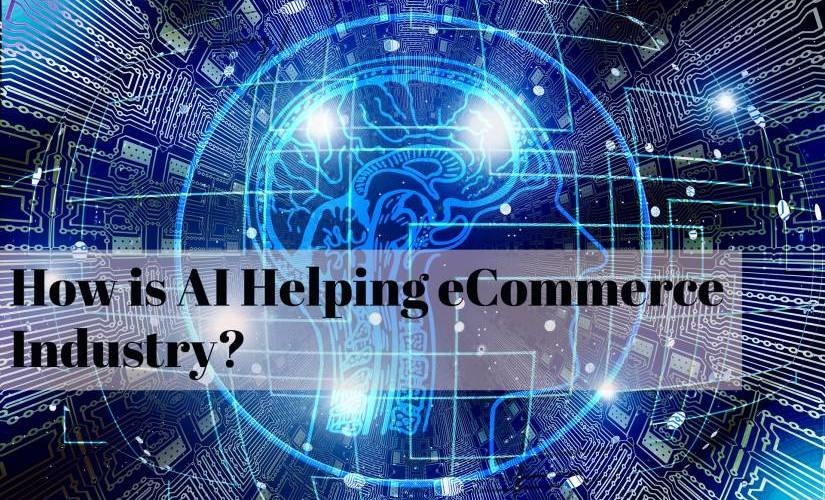How is AI Helping the eCommerce Industry?
How is AI Helping the eCommerce Industry?

The eCommerce industry is booming like never before with the introduction of new technologies. The eCommerce industry is witnessing a redefined form that takes customers to a new level of experience and gratification. But how is AI helping the eCommerce industry?
Traditionally, retail businesses were satisfied by just making an eCommerce website for their brick and mortar stores, but it is not enough now. You have to evolve with new emerging technologies to provide immense value to the users. Contributing value to your users is the only way to sustain, grow, and outshine your business rivals.
Artificial intelligence is the next promising technology with great potential to bring a paradigm shift to not only eCommerce but almost all industries. The eCommerce industry has embraced AI with open hands because of the exceptional benefits it offers. Retail businesses are implementing AI to improve various processes, customer experience, and at last, revenues.
Let’s discuss how AI is changing the eCommerce industry:
Personalization is Important
Before AI, personalization was there in the eCommerce industry, but of limited value. Artificial intelligence and machine learning technology have taken it to a new level altogether. If you use services such as Amazon or eBay, you must have surely experienced it.
Artificial intelligence enables you to examine customer interactions on multiple platforms such as websites, mobile apps, and emails. Further, with data analytics, you can make personalized offers and product recommendations to the customers. With such customized customer-centric approach, you can win the engagement and loyalty from the customers.
And through an in-depth mapping of the customers, grabbing their attention when they are likely to take action, is entirely possible. It is all about hitting the right chord at the right time.
With a new semantic-based search option, customers are now able to search smartly and get relevant results that are of their interest. AI can recognize, understand, and respond to human semantic and hence can come up with relevant search results.
Automated Chatbots:
Welcome to the world of voice assistants and automated Chatbots, without whom, we cannot discuss artificial intelligence. If you have visited the eCommerce websites, you might have seen a chat window pop-up at the bottom-right corner. These are programmed Chatbots that makes the user experience more pleasant and superior. One of the best features of the AI is that it has eliminated human intervention while interacting with the customers.
While browsing through the products listed on the website or an app, at times, the customer might face some confusion or disconnect. There might be many reasons for such disinterest. In such situations, Chatbots can help them solve their queries or questions instantly. Whether it is about a particular product’s availability or query regarding the comparison of products or any payment issues, Chatbots with their human-like intelligence can come to the rescue and help keep the customers’ interest intact.
Chatbots have added a fresh perspective by adding a personal touch to the customer’s journey along with boosting conversion rates and ultimately, revenues.
Voice assistants:
We all are aware of Amazon’s Alexa; it indeed is one of its kind; a virtual assistant that has carved a niche for itself by empowering customers to control things. Internet of Things has tremendous potential for the eCommerce industry and as per the industry experts; it will soon transform the way people search for products and services.
eCommerce Industrial experts forecast that the voice assistants will be present on all eCommerce websites and apps to interact with the customers and to give them a more personal experience.
Decision making
In the era of cut-throat competition, it is essential that you make the right decisions at the right time. Thanks to AI and Big Data, businesses with the help of AI tools can get a massive chunk of data and analyze it perfectly to create actionable insights, and make the right decisions regarding product pricing, inventory or to create personalized offers for the customers. With crucial data insights from AI tools, businesses can make better decisions that help to leverage resources and opportunities.
Businesses can now access details about the market competition and the dynamics and come up with optimal pricing, directly through learning algorithms and predictive analysis. Also, AI helps businesses to manage inventory in a better way by analyzing past purchase records, stock, and actual sales records.
Further, with the help of AI, you can evaluate your strategy and get a detailed report on the actions that worked and the ones that failed. It enables you to design better strategies with more meaningful patterns and actions.
Giant businesses, including Coca Cola, are investing in AI to drive more success by superior decision making.
Reviewing the reviews
Whether you believe it or not, reviews play a considerable role in shaping the users’ buying decisions. As per the Bright Local survey, 87% of users believe in reviews and make decisions accordingly. However, not all of these reviews are genuine and submitted by real, authentic users. Business rivalries play a considerable role in such fake reviews, where they demean their competitors by posting unfavorable reviews. The negativity from review discussions could be a concern that requires your immediate attention.
Thanks to AI, you can now quickly get rid of such fake reviews by identifying the genuine ones. Machine learning algorithms can analyze user-generated content and put such reviews on top of the list. For that matter, even Amazon has come up with a new machine learning algorithm that can rank the genuine reviews and ratings on the top of the list. Amazon identifies honest reviews by analyzing different factors such as upvotes, verification of users, and recency.
Inventory management and sales forecasting.
Inventory management and sales forecasting are immensely helpful for any business. Sales forecasting helps predict the percentage of products that can be sold in a specific time-frame. Also, it proves to be a cost-effective method as you can avoid stocking products that are not in demand. All this is now possible because of AI and Big Data.
With the data availability of previous purchases and buying behavior of the users, analyzing future sales can be done more accurately and efficiently. You can also strategize the marketing plan for certain products during a specific period. Also, with a clear insight into the product demand, you’ll be able to manage the stocks accordingly. Hence, with demographic user behavior and weather, analytics can help to manage inventory better.
CRM:
Gone are the days when your marketing and sales activities were run on spreadsheets. Today, there are new CRM tools available in the market that can do the job more effortlessly and with precision.
Artificial intelligence can be used to make CRM more effective and accurate. Currently, many businesses are using various AI tools to evaluate potential leads, data from social media, essential recommendations, and for automatic data entry, data analysis to strengthen marketing and sales activities.
Customer-centric visual search:
Irrelevant search results are a big turn off for customers. Despite entering appropriate keywords in the search bar, customers end up finding irrelevant results. Due to this, you might end up losing a potential customer. AI can easily decode human language and hence can easily generate relevant results for the users.
Furthermore, for advanced search, AI enables visual search option to find the exact products. For example, you can take a picture of your friend’s shirt and upload it on the website, and the AI will find similar shirts from different vendors for you. Amazon is one such retailer who has already started using this technology. It brings more favorable results for customers and saves their time too.
Product description writing
Amazon US has more than 600 million products. When it comes to SEO point of view, each product requires a detailed, accurate product description for SEO ranking. Obviously, it is a time-consuming and expensive procedure to write a description of each product. Experts hope that AI will serve the purpose well by writing product descriptions that are SEO-optimized and original. Just by knowing the key features of the product, AI will write a unique description and summary.
Conclusion:
Artificial intelligence comes with a storm of opportunities for eCommerce industry that cannot be ignored. The eCommerce companies will see new dawn where businesses will be able to serve customers in a more meaningful and productive way with the help of AI and ML technology. The processes will be quick and accurate, accuracy would be higher, and customers would get instant gratification with personalized offers and recommendations.
The post How is AI Helping the eCommerce Industry? appeared first on ReadWrite.
(43)


